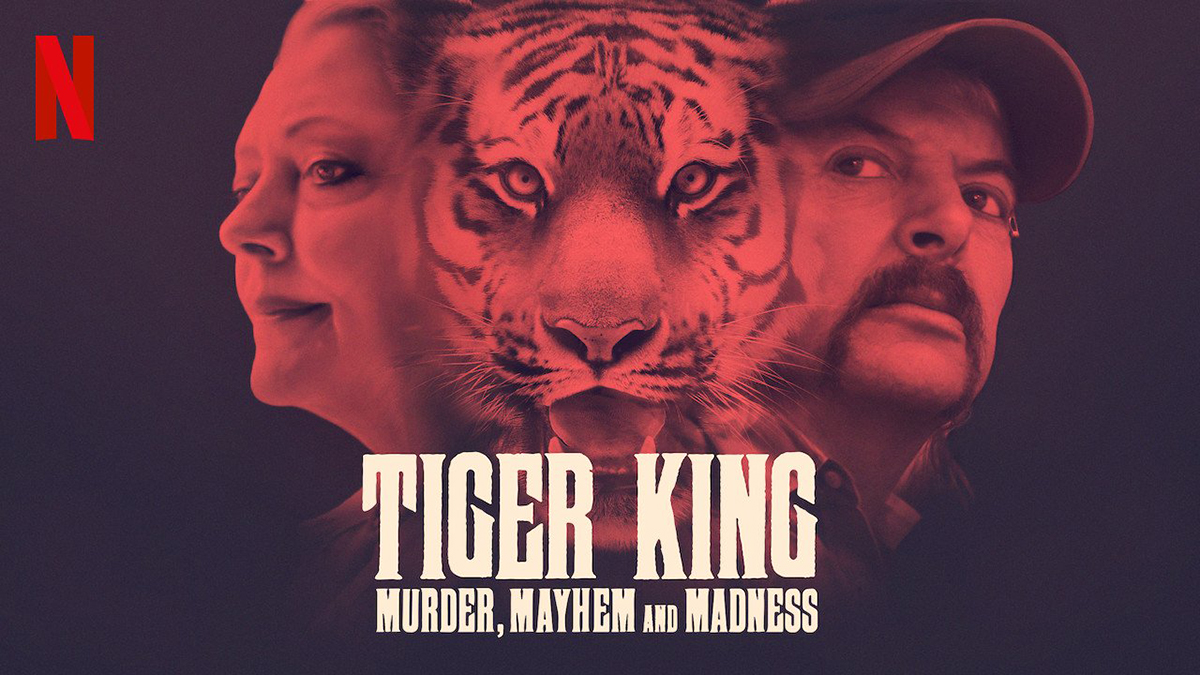When you sit down to watch Tiger King, be prepared not to get up for the next six hours, because you will not be able to tear your eyes away from the trainwreck that is unfolding in front of you.Tiger King is a show not about domesticated tigers, but about the people crazy enough to keep them.
The filmmakers of this Netflix docuseries originally intended to do for big cats what Blackfish did for whales. The journey of Eric Goode and Rebecca Chaiklin, the co-writers and directors, in meeting the outrageous characters that keep big cats like lions and tigers in their backyard led them to Joseph Maldonado-Passage, better known as Joe Exotic. Exotic, a gun-wielding reality TV star who is “gay as a $3 bill” runs a roadside zoo in Oklahoma with over 200 big cats, ran for president in 2016, is an aspiring country-music singer and magician, and ends up in prison, convicted of murder-for-hire. And he isn’t even the craziest thing about the show.
The show unfolds into a five-year-long production centred around the feud between Joe Exotic and Carole Baskin, the owner of Big Cat Rescue in Florida. Baskin, the so-called “Mother Teresa of big cats” runs a retirement home for rescued lions and tigers, giving them a place to live out the rest of their lives. Baskin’s main mission is to stop the breeding of big cats, and she has made many enemies with those who believe it is their right to own these animals as pets and make money off them. The docuseries leans heavily on the side of Joe Exotic, portraying Baskin as a villain, and Exotic as a misunderstood, wacky character who loves his tigers much like you love your French bulldog.
That being said, there is no definite protagonist in the series; rather, it’s a show filled with antagonists where you don’t know whom to hate the most, because they’re all equally manipulative, exploitative, and abusive toward both people and animals. Instead of redeeming character arcs that we often see in movies, the characters continue to get worse and worse as the show progresses.
The ownership of big cats revolves around money, love, and power — but mostly money. Tiger cubs are highly profitable, as crowds will pay to pet and take their picture with a baby tiger. One tiger between the ages of four and 16 weeks old creates a profit of $100,000, according to Joe Exotic, and each baby tiger on the black market can get you a minimum of $2,000. The problem with this, according to Baskin, is that the cubs become too dangerous to play with at 12 weeks of age and live up to 20 years after that, so many tigers are simply put to death when they are no longer profitable.
By the second episode, you will start learning about the cult-like nature of these roadside zoos and the predatory owners of them who use their cats to bait people. Another character on the show, Mahamayavi Bhagavan “Doc” Antle runs a zoo in Myrtle Beach. The series portrays him as preying on insecure girls, turning them into apprentices and using them for sex and cheap labour. He claims his zoo is run by one cohesive family unit. Then there is Jeff Lowe, a so-called businessman and investor who gave the memorable quote: “A little pussy gets a lot of pussy,” meaning that Lowe used tiger cubs to seduce younger women. Joe Exotic preferred to prey on those who were down on their luck, or drug addicts. Exotic gave all the meth he could to his two husbands at the time, both of whom he met when they were just 19, to keep them in his life and ultimately control them, leading to disastrous results.
Ultimately the show is about Exotic vs. Baskin, a feud that is eerily similar to the one we all saw play out in 2016 in the U.S. elections: a narcissistic reality-TV star who does and says outrageous things versus a woman with a questionable past but who appeals to the public’s morals. Throughout the entire five hours of the docuseries, there are about five minutes at the end discussing endangered tigers in the wild and their protection. One especially poignant scene is when dozens of these creatures, exploited for entertainment, are rushing and fighting over chunks of roadkill. The series’ salacious details about the twisted personal lives of these zoo keepers makes perfect binge-worthy TV material, but does little to educate the viewer on the actual rehabilitation and endangerment of tigers in the wild.
My three takeaways from the show: don’t do drugs, Carole Baskin killed her husband, and if Joe Exotic’s eyebrow ring can hang on to his face through all six episodes, I can hang on to my sanity through this quarantine.
Andrea Sadowski is working towards her BA in Global Development Studies, with a minor in anthropology and Mennonite studies. When she's not sitting in front of her computer, Andrea enjoys climbing mountains, sleeping outside, cooking delicious plant-based food, talking to animals, and dismantling the patriarchy.


